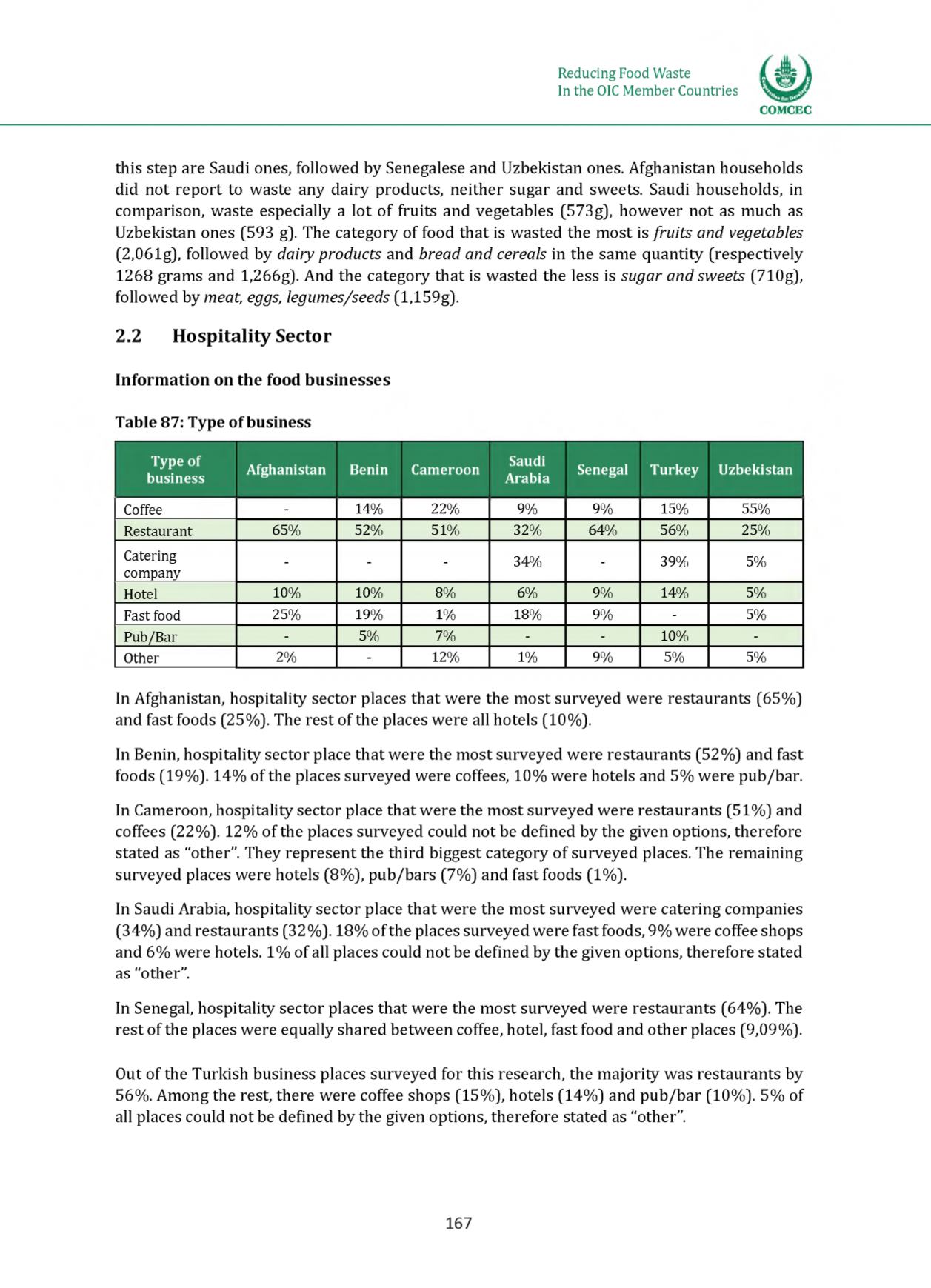

COMCEC
Reducing Food Waste
In the OIC Member Countries
this step are Saudi ones, followed by Senegalese and Uzbekistan ones. Afghanistan households
did no t repo rt to waste any dairy products, neither sugar and sweets. Saudi households, in
comparison, waste especially a lo t o f fruits and vegetables (573 g), however no t as m uch as
Uzbekistan ones (593 g). The category of food tha t is wasted the m ost is
fruits and vegetables
(2,061g), followed by
dairy products
and
bread and cereals
in the same quantity (respectively
1268 grams and 1,266g). And the category tha t is wasted the less is
sugar and sweets
(710g),
followed by
meat, eggs, legumes/seeds
(1,159g).
2.2
H o s p ita lity Sec tor
Information on the food businesses
Table 87: Type of business
Type of
business
Afghanistan Benin Cameroon Saudi
Arabia Senegal
Turkey Uzbekistan
Coffee
-
14% 22%
9%
9% 15% 55%
Restaurant
65%
52% 51%
32% 64% 56% 25%
Catering
company
-
-
-
34%
-
39%
5%
Hotel
10%
10% 8%
6%
9% 14%
5%
Fast food
25%
19% 1%
18% 9%
-
5%
Pub/Bar
-
5%
7%
-
-
10%
-
Other
2%
-
12%
1%
9% 5%
5%
In Afghanistan, hospitality sector places tha t were the m o st surveyed were restaurants (65%]
and fast foods (25% ). The rest of the places were all hotels (10% ).
In Benin, hospitality sector place th a t were the m ost surveyed were restaurants (52% ) and fast
foods (19% ). 14% of the places surveyed were coffees, 10% were hotels and 5% were pub /ba r.
In Cameroon, hospitality sector place tha t were the m ost surveyed were restaurants (51% ) and
coffees (22% ). 12% o f the places surveyed could no t be defined by the given options, therefore
stated as “other”. They represent the th ird biggest category o f surveyed places. The rem aining
surveyed places were hotels (8% ), p ub /b a rs (7% ) and fast foods (1% ).
In Saudi Arabia, hospitality sector place th a t were the m ost surveyed were catering companies
(34% ) and restaurants (32% ). 18% o f the places surveyed were fast foods, 9% were coffee shops
and 6% were hotels. 1% of all places could n o t be defined by the given options, therefore stated
as “other”.
In Senegal, hospitality sector places tha t were the m ost surveyed were restaurants (64% ). The
rest of the places were equally shared between coffee, hotel, fast food and other places (9,09%).
O ut of the Turkish business places surveyed for this research, the m ajority was restaurants by
56% . Am ong the rest, there were coffee shops (15% ), hotels (14% ) and p u b /b a r (10% ). 5% of
all places could n o t be defined by the given options, therefore stated as “other”.
167
















